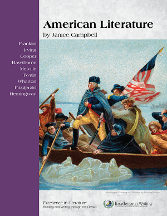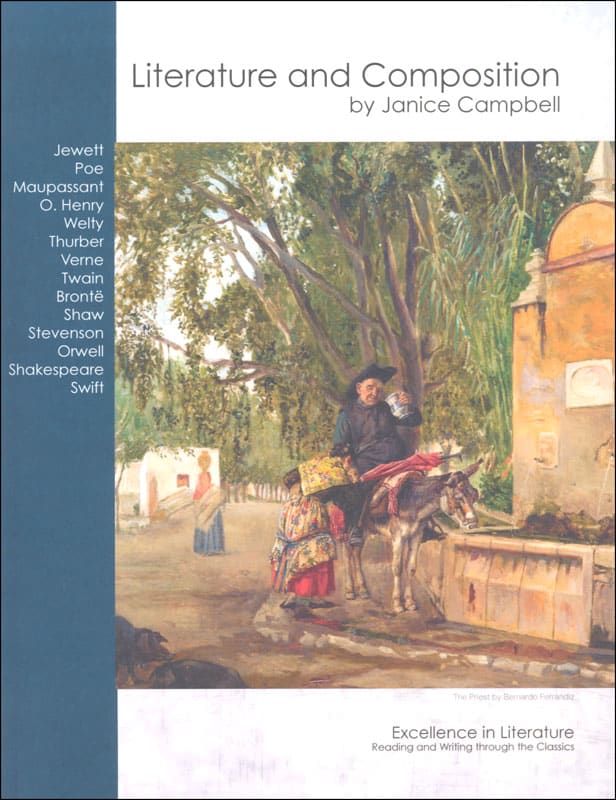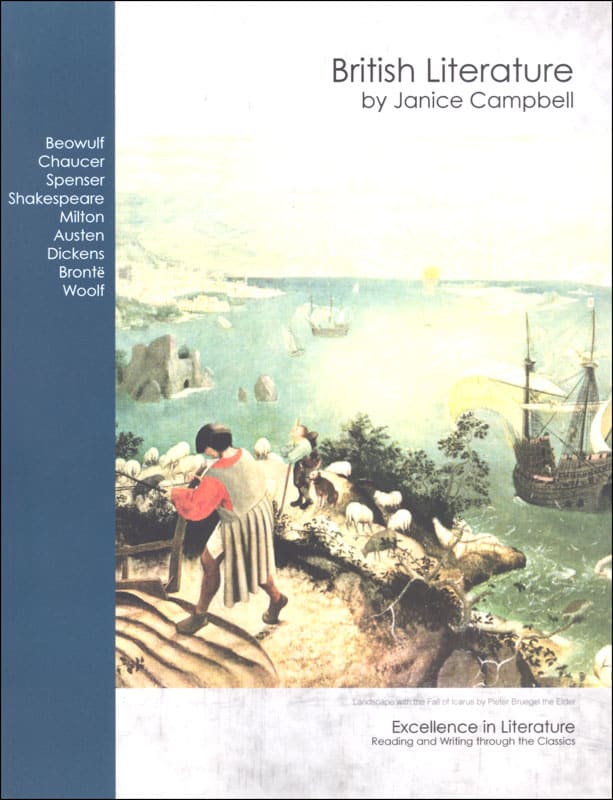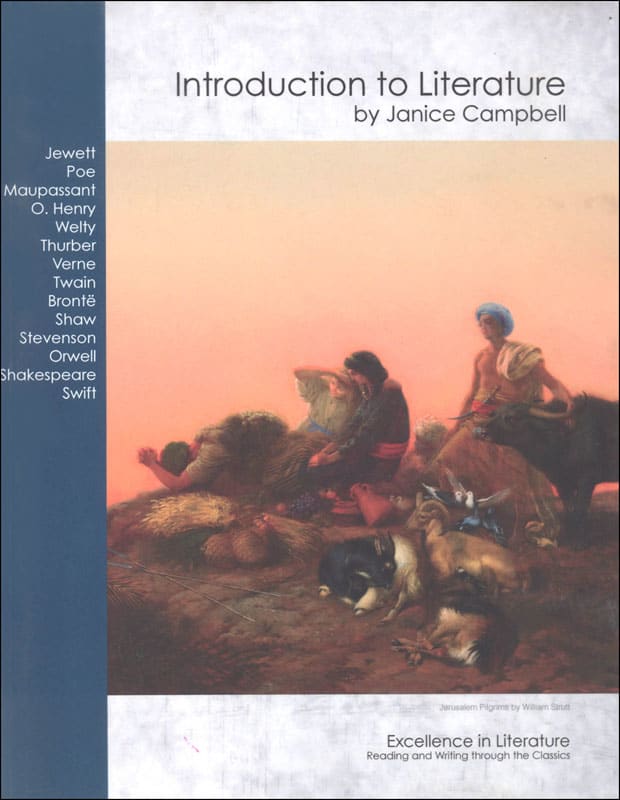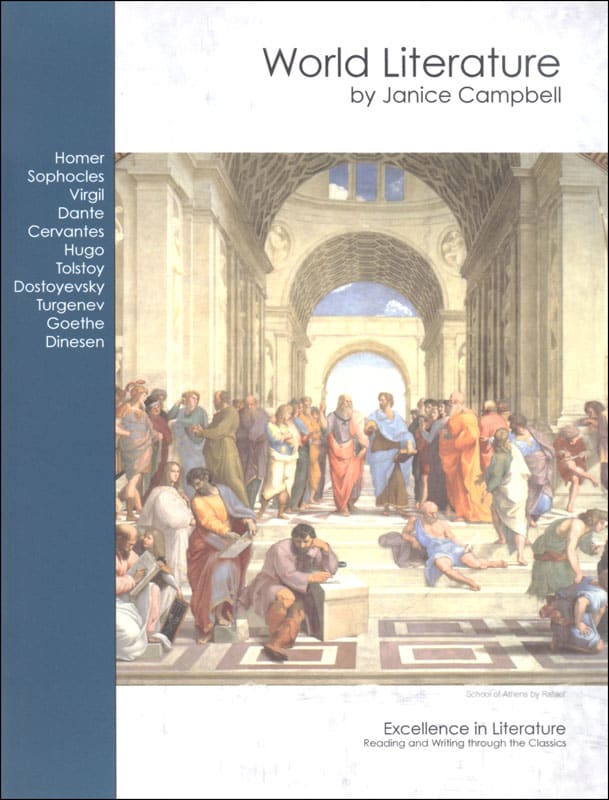These five Excellence in Literature books guide students in grades 8 through 12 through self-directed study of classical literature. Titles of the five courses and the order in which they should be studied are:
Introduction to Literature
Literature and Composition
American Literature
British Literature
World Literature
The five literature books are available in print and as PDFs. (There is also a single PDF for all of the literature courses that offers huge savings.)
Author, Janice Campbell wants to prepare students well for rigorous college work, so she directs them to do their own independent research and writing while reading each classic work. Truly designed for independent study, the only “oversight” is the requirement for a writing evaluator to use the provided Evaluation Rubric form to let students know how well they are satisfying the demands of each written assignment that is the culmination of the study of each work. Nevertheless, students would benefit greatly if they could meet for a once-a-week session with other students to discuss their work.
Students should have well-developed writing skills and a solid grasp of grammar and spelling. However, since some students might not have had much experience writing essays, Campbell includes seven pages of instruction on "How to Write an Essay" in the fore matter of each guide. For students who need additional instruction or practice with essay writing, Campbell recommends resources such as The Lost Tools of Writing, The Elegant Essay Writing Lessons, and her own Excellence in Literature: Handbook for Writers. She also recommends Teaching the Classics: A Socratic Method for Literary Education if students lack prior experience with literary analysis.
All five courses are similar in their arrangement. In fact, much of the front matter, as well as most of the "Formats and Models" and "How to Evaluate Writing" chapter near the end of each book are identical. The information in those sections is valuable, and the actual lessons refer student to the various sections from time to time. The course work itself is presented in nine modules that guide students through the study of specific literary works. It should take four weeks to complete each module. Suggested schedules for each module are near the front of each book.
The study of each literary work follows a similar format each month. Students select the version of the work they will read. Sometimes, specific versions of a work are recommended, including free, online version. Campbell provides students with minimal background information within the guides. Instead, she directs students to numerous context resources that they are to explore the first week of each module. These might be internet resources (specific URLs), other books, DVDs, audio resources, and even field trips that help students explore the background and author of the particular work they will be reading as well as history, art, and music relating to the historical era of the literary work. Many resources are available through ExcellenceInLiterature.com. Most research will likely be completed online. The PDF versions of these guides are my recommendation because they make it so much easier to follow the links.
Students should read through the assignments for the entire unit and select context resources that are most likely to be helpful as they complete all of their assignments. Each module concludes with an Assignment Schedule with detailed instructions for each week. The Assignment Schedules provide details not included in the suggested schedules near the front of the book.
Writing assignments vary from module to module. Students might write an Approach Paper one week, an Author Profile the next week, a Literary Analysis Essay the third week. Another module might assign the Author Profile the first week, a Historical Approach Paper, the second week, and a Literary Analysis Essay the third week. Literary Analysis Essays will probably be the lengthiest and most-demanding of the assignments. A parent or writing mentor will use the rubric form to evaluate the essays, then students will revise and rewrite their essays during the fourth week.
Detailed explanations of the formats for each type of paper are included in the Formats and Models section of each guide, along with samples of excellent student work for each format. Students also learn to use the MLA formatting conventions that they will need to know for college papers.
In addition to the guide and the books they will read, students must have a good dictionary, a thesaurus, a writer's handbook, and a binder where they will accumulate their course work. It is expected that students will look up vocabulary words with which they are unfamiliar as well as grammatical and structural questions. A glossary at the back of each book defines literary terms used in the course.
Literary analysis in Campbell's courses focuses on deep reading and thinking rather than superficial comprehension. For example, one assignment for a literary analysis essay in American Literature reads: "Write a 650-word essay comparing and contrasting the courtship strategies of Irving's characters, Ichabod Crane and Brom Bones, with Longfellow's characters, Miles Standish and John Alden" (p. 77) (The prompt continues with some specific questions that student should address.) Students will need to have comprehended the details of the story to answer this question, but they also must think much more deeply to identify points of comparison and contrast in multiple works of literature.
Literary works are studied in a somewhat chronological fashion that is most apparent in American, British, and World Literature. However, you can use modules in whatever order you wish. In fact, you can even mix modules from the various volumes since the study format is the same for all courses.
In my opinion, most of the selected literary works are some of the most interesting and entertaining, although some are certainly very challenging. Some of the literary works are classics that have stood the test of time, and many of them deal with important life questions world views.
Introduction to Literature begins the first lesson with a little more instruction and a gentler pace as students read six short stories and become familiar with the methodology. As students continue the course, they will read Around the World in Eighty Days, A Connecticut Yankee in King Arthur's Court, Jane Eyre, Pygmalion, Treasure Island, Animal Farm, The Tempest, and Gulliver's Travels.
Literature and Composition introduces students to Robinson Crusoe, Walden, The Count of Monte Cristo, Heart of Darkness, Till We Have Faces, Death Comes for the Archbishop, Julius Caesar, Ivanhoe, and The Importance of Being Earnest.
In American Literature students will study Benjamin Franklin's Autobiography, The Last of the Mohicans, The House of Seven Gables, Moby Dick, The Adventures of Huckleberry Finn, The House of Mirth, The Great Gatsby, and The Old Man and the Sea. One of the modules combines the study of Rip Van Winkle, The Legend of Sleepy Hollow, and works by Henry Wadsworth Longfellow. (You might want to use this course in conjunction with IEW's Advanced U.S. History-Based Writing Lessons. The Advanced U.S. History-Based Writing Lessons course includes optional lessons from American Literature, coordinating assignments from both courses.)
In British Literature, students will study Beowulf, Canterbury Tales, Sir Gawain and the Green Knight and other Arthurian works, King Lear, Paradise Lost, Pride and Prejudice, Great Expectations, Wuthering Heights, and To the Lighthouse.
World Literature uses what necessarily has to be a very limited selection of literary works to cover from the Ancient Greeks to the modern era. Works studied include The Odyssey, Antigone, The Aeneid, Diving Comedy: Inferno, Don Quixote, Les Miserables, selections from The Portable Nineteenth-Century Russian Reader, Faust, and both Out of Africa and "Babette's Feast" in a combined study.
The high school courses can easily become Honors courses if students read an additional book listed for each unit and complete an additional "Approach Paper" on that book. They are also required to write an additional six- to ten-page paper. At that point, Honors students should be prepared to take the corresponding CLEP exam to both demonstrate advanced proficiency and earn college credits.
While these are not specifically designed to be worldview courses, Campbell sometimes integrates worldview type questions as she directs students' attention in their study of some books. Campbell includes a chapter titled "Discerning Worldview through Literary Periods" to aid both student and teacher in exploring literature with worldviews in mind.
Students completing these courses should be miles ahead of most of their high school contemporaries in their ability to read and analyze literature at a sophisticated level. The challenging writing assignments also promise to develop student skills in composition to a high level.





